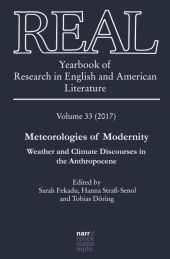 Neuerscheinungen 2017Stand: 2020-02-01 |
Schnellsuche
ISBN/Stichwort/Autor
|
Herderstraße 10
10625 Berlin
Tel.: 030 315 714 16
Fax 030 315 714 14
info@buchspektrum.de |

Tobias Döring, Sarah Fekadu, Hanna Straß-Senol
(Beteiligte)
Meteorologies of Modernity. Weather and Climate Discourses in the Anthropocene
Herausgegeben von Fekadu, Sarah; Straß-Senol, Hanna; Döring, Tobias
1. Auflage. 2017. X, 289 S. 230 mm
Verlag/Jahr: NARR 2017
ISBN: 3-8233-8157-1 (3823381571)
Neue ISBN: 978-3-8233-8157-0 (9783823381570)
Preis und Lieferzeit: Bitte klicken
Meteorologies of Modernity explores the ways in which literature reflects and participates in discourses on weather and climate historically as well as at our contemporary moment. Literature contains a huge meteorological archive built throughout the centuries. The essays collected in this volume therefore ask to what extent literature can bring the vastness and complexity of climate change into view, how literature offers ways to think through the challenges of the Anthropocene both culturally, historically, and aesthetically, and, last but not least, how it helps us to conceptualize a radically new understanding of what it means to be human. The thirteen contributions from literary and cultural studies address weather and climate discourses from a variety of conceptual angles and cover a broad range of historical and geographical contexts. Topics include representations of tropical climates in Shakespeare, the close yet tense relationship between literature and the rising discipline of meteorology in the nineteenth century, allegories of climate change in postcolonial literature, and climate catastrophes in the contemporary clifi novel. By employing a historicizing and comparative approach, the volume addresses the need for studying representations of climate and climate change in an interdisciplinary, transnational and transhistorical framework, overcoming traditional disciplinary boundaries and creating new collectives of theory and criticism that are essential when debating the Anthropocene.


